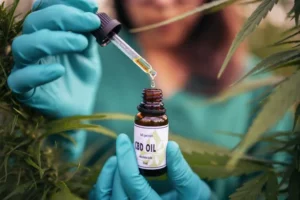Cannabidiol (CBD) has quickly gained popularity in the wellness world, hailed for its potential to improve various aspects of physical and mental health. Derived from the cannabis plant, CBD is a non-intoxicating compound that doesn’t produce the “high” associated with its counterpart, tetrahydrocannabinol (THC). But what makes CBD so appealing, and how can it support health and well-being? Let’s explore the science, benefits, and practical considerations of CBD.
What is CBD?
CBD is one of over 100 cannabinoids found in the cannabis plant. Unlike THC, CBD does not cause psychoactive effects. It interacts with the body’s endocannabinoid system (ECS), a complex network of receptors, enzymes, and endocannabinoids that help regulate various functions, including mood, sleep, pain, and immune response.
By influencing the ECS, CBD is thought to promote balance in the body, which could explain its broad range of potential health benefits.

Potential Health Benefits of CBD
- Pain Relief
CBD has been shown to reduce chronic pain by interacting with ECS receptors. Studies suggest it may help with conditions such as arthritis, fibromyalgia, and migraines. - Reduced Anxiety and Stress
One of CBD’s most well-known uses is its ability to reduce anxiety and stress. Research indicates it can help alleviate symptoms of generalized anxiety disorder, social anxiety, and post-traumatic stress disorder (PTSD). - Improved Sleep
CBD may support better sleep by reducing insomnia and promoting relaxation. It’s particularly beneficial for individuals whose sleep issues are linked to anxiety or chronic pain. - Anti-Inflammatory Properties
CBD’s anti-inflammatory effects make it a promising option for managing conditions like inflammatory bowel disease (IBD), psoriasis, and even acne. - Neuroprotective Potential
Emerging research suggests that CBD may have neuroprotective properties, which could benefit conditions like epilepsy, multiple sclerosis, and Parkinson’s disease. - Support for Mental Health
CBD has been explored as a complementary treatment for depression and other mood disorders. Its ability to influence serotonin receptors could explain its positive effects on mood.
Common Uses of CBD
- Oils and Tinctures: These are taken sublingually (under the tongue) for quick absorption.
- Edibles: Gummies, capsules, and other infused foods offer a discreet and easy way to consume CBD.
- Topicals: Creams, balms, and salves are applied directly to the skin to target localized pain or inflammation.
- Vaping: Inhaling CBD provides fast-acting relief, though it may not be suitable for everyone due to potential respiratory risks.
- Beverages: Infused teas, coffees, and other drinks are becoming increasingly popular for casual use.
Is CBD Safe?
CBD is generally considered safe, with most people experiencing minimal side effects. However, some individuals may experience:
- Fatigue
- Dry mouth
- Changes in appetite
- Diarrhea
It’s essential to start with a low dose and gradually increase it to find the right balance for your needs. Additionally, CBD can interact with certain medications, so consulting a healthcare provider before use is recommended, especially if you’re taking prescription drugs.
What to Look for When Buying CBD
- Third-Party Lab Testing: Always choose products tested by independent labs to ensure potency and purity.
- Hemp Source: Look for CBD derived from organically grown hemp, free of pesticides and harmful chemicals.
- Type of CBD:
- Full-Spectrum: Contains all cannabinoids, including trace amounts of THC.
- Broad-Spectrum: Includes cannabinoids but no THC.
- CBD Isolate: Pure CBD with no other compounds.
- Dosage Transparency: Reliable brands clearly indicate CBD concentrations on their labels.
Legal and Regulatory Considerations
CBD laws vary by country and state. In many regions, CBD products derived from hemp (containing less than 0.3% THC) are legal. However, regulations can change, so it’s essential to verify local laws before purchasing or using CBD.
Final Thoughts
CBD is a versatile and promising compound with the potential to support health and well-being. Whether you’re looking to alleviate pain, reduce anxiety, or improve sleep, CBD may offer a natural alternative or complement to traditional treatments.
As with any supplement, it’s important to do your research, choose high-quality products, and consult a healthcare professional to ensure safe and effective use.
CBD’s journey in the wellness world is just beginning, and as research continues, its potential benefits may become even clearer. Whether you’re a skeptic or a supporter, CBD’s rise highlights a growing shift toward natural and holistic approaches to health.
